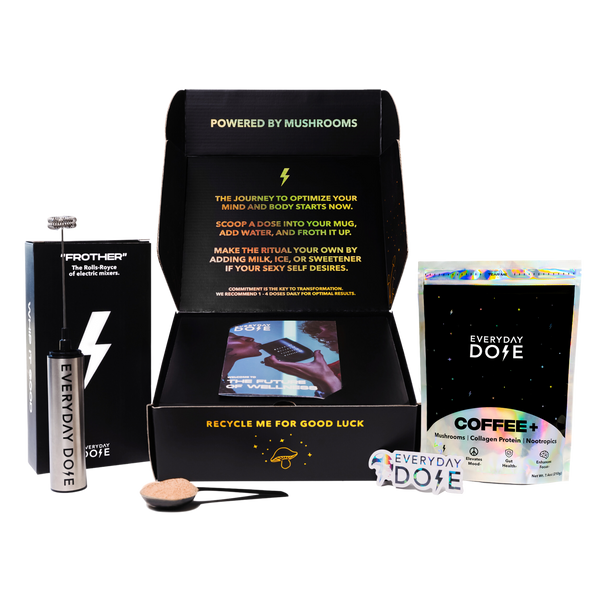Decaf Coffee: Is It Safe?

Caffeine doesn’t agree with everyone — some people experience bloating after drinking too much coffee, while others experience sweating and anxiety. For one reason or another, many people choose to drink decaffeinated coffee as their main morning pick-me-up.
If this is you, you may be wondering if decaf coffee is actually a safe alternative to regular coffee. Read on to learn more about how decaf coffee is made, its benefits, and alternatives you can try.
How Is Decaf Coffee Made?
All decaf coffee starts the same way regular coffee does: with coffee beans. Raw coffee beans come from coffee plants, which grow in warm climates in South America and Africa. There are many types of coffee plants, but Coffea arabica and Coffea canephora (Also called robusta) are the most commonly used for coffee making.
These whole beans are then steamed to help open their pores, which makes it easier to extract the caffeine. After this, the decaffeination process truly begins.
Solvent-Based Methods
For the European method of decaffeination, the beans are then soaked in a methylene chloride solution. This solution binds to the caffeine and draws it out of the beans. The liquid is then removed and the beans are roasted at extremely high temperatures to evaporate any remaining solution.
There is also an indirect method of decaffeination that also uses solvents. This method involves soaking the beans in water, then removing the water and treating it with a solvent to remove the caffeine. The liquid is then added back to the coffee beans so they can reabsorb the flavor.
Non-Solvent-Based Methods
Of course, there are also decaffeination methods that do not use solvents. One is the Co2 method, where carbon dioxide is added to the coffee beans. The carbon dioxide binds to caffeine and is then flushed out using high amounts of pressure.
Some roasters also use the water method, which is sometimes called the Swiss water process. For this process, coffee beans are soaked in water. The water is then passed through a series of charcoal filters to remove caffeine and then added back to the beans to restore flavor.
Is Decaf Coffee Safe?
Now, let’s get back to our first order of business: Is decaf coffee safe? Since roughly 10 percent of Americans drink decaf coffee, this is no small concern.
The first thing to keep in mind is that all methods of making decaf coffee have been approved by the Food and Drug Administration (FDA). Solvent-based decaffeination methods are carefully regulated, and only 10 parts per million of methylene chloride are allowed to remain in decaf coffee.
That said, plenty of people have concerns about the chemicals used in solvent-based methods. Methylene chloride is technically a carcinogen when used in large amounts, as are other solvents that are often used in these processes. These solvents are almost entirely removed from the coffee beans, but many people are still wary of any residual chemicals in their cups of coffee.
Why Do People Drink Decaf Coffee?
Who knew drinking coffee could be so controversial? There are still more layers to this issue, though, as many coffee drinkers prefer decaf coffee over caffeinated coffee. There are many reasons they may choose decaf, and all of them have to do with the potential side effects of caffeine.
These side effects can include:
- Feelings of anxiety and stress
- Jitters
- Sweating
- Racing heartbeat
- Brain fog
- Trouble sleeping
- Tiredness
- Digestive upset
- Heartburn
- Nausea
Many of these side effects only occur if you drink too much caffeine. Unfortunately, everyone has their own caffeine tolerance. Some people can drink tons of caffeine while others start experiencing these symptoms after just one cup of coffee.
What Are the Alternatives to Decaf Coffee?
If you tend to experience side effects of caffeine after just one or two cups of coffee, you’re probably looking for ways to minimize your caffeine intake. There are also some people who need to lower their caffeine consumption due to medical reasons, such as pregnant women and those with anxiety, heart conditions, or gastrointestinal disorders.
Some people take the route of going decaf, but others have a hard time adjusting to the taste of decaf coffee. If this is you, here are a few options you can try.
Low-Caf Coffee
Not all coffee is created equal. Some types of coffee have lower amounts of caffeine, which makes them a great place to start for anyone looking to lower their caffeine intake.
Look for dark roast coffee, which is often less acidic as well. Some popular dark roast coffees include espresso, French roast, and Italian roast coffees. Single-origin coffees from Sumatra, Kenya, and Columbia also tend to have the full-bodied flavor of dark roast coffee.
Functional Coffee
You can also try a functional coffee blend like our Mushroom Coffee+. This coffee features the robust taste you know and love along with a nootropics blend to support focus and provide other health benefits.
This low-caffeine blend includes:
- Lion’s mane mushroom to support focus and gut health
- Chaga mushroom to support the immune system
- L-theanine to encourage feelings of relaxation and high-quality sleep
- Coffee extract to provide flavor and support feelings of energy
- Collagen protein to support gut health
All you have to do to enjoy our coffee is mix it with hot water and give it a stir. You can also make a delicious mushroom coffee latte or try it in a smoothie.
Tea
Black, green, oolong, and white tea all come from the same plant and can be great low-caffeine options. If you like these teas, you might also want to try matcha, which has a similar amount of caffeine as regular coffee. Matcha also contains L-theanine, which can mitigate the side effects of caffeine.
Of course, there are plenty of teas that don’t have caffeine at all. Herbal teas like rooibos, dandelion root, and chicory all have similar tastes to coffee but are completely caffeine-free.
The Bottom Line
If caffeine disagrees with you, then you may be interested in trying decaf. While decaf coffee is safe and its production is highly regulated by the FDA, it might not be your answer. Instead, you might just want to limit caffeine to whatever your natural tolerance is.
Our Mushroom Coffee+ only features 40 mg of caffeine per serving, so it’s a great low-caf option to consider. Try our blends today to see the benefits for yourself!
Sources:
Banning European Method decaf would defy science and harm Americans’ health | NCA
eCFR :: 21 CFR Part 173 -- Secondary Direct Food Additives Permitted in Food for Human Consumption
Start your day
The Right Way








